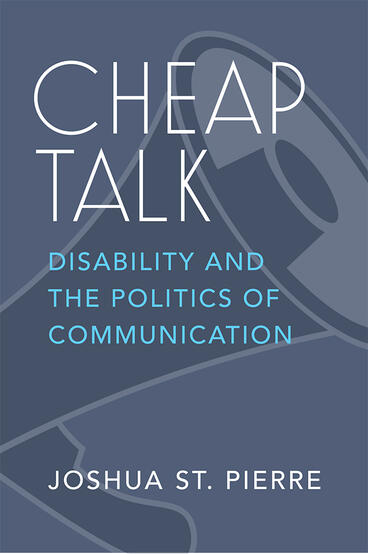How speech has been made cheap to meet the inhuman appetites of capital
Description
In Cheap Talk: Disability and the Politics of Communication, Joshua St. Pierre flips the script on communication disability, positioning the unruly, disabled speaker at the center of analysis to challenge the belief that more communication is unquestionably good. Working with Gilles Deleuze’s suggestion that “[w]e don’t suffer these days from any lack of communication, but rather from all the forces making us say things when we’ve nothing much to say,” St. Pierre brings together the unlikely trio of the dysfluent speaker, the talking head, and the troll to show how speech is made cheap—and produced and repaired within human bodies—to meet the inhuman needs of capital. The book explores how technologies, like social media and the field of speech-language pathology, create smooth sites of contact that are exclusionary for disabled speakers and looks to the political possibilities of disabled voices to “de-face” the power of speech now entwined with capital.
Joshua St. Pierre is Canada Research Chair in Critical Disability Studies and Assistant Professor of Political Science at the University of Alberta.
Reviews
“Much more than an academic monograph, Cheap Talk is a disability poetics and yet also a kind of theoretical novel centering on three characters: the dysfluent speaker, the troll, and the talking head. Almost-unbelievably wide-ranging and thorough in its consideration of acts of communication and economies of information, yet driven by vivid and memorable vignettes and a careful weaving of voices, Joshua St. Pierre’s book vitalizes dysfluency and disrupts our control over communication, whether globalized or internalized.”
- Jay T. Dolmage, University of Waterloo
—Jay T. Dolmage, University of Waterloo
“St. Pierre has produced a work that is philosophically and theoretically rich while remaining accessible to a wide range of readers. The book’s careful attention to non-normative modes of communication and exchange works to push past the boundaries of liberal humanist understandings of intelligibility and inclusion towards radically new spaces of political belonging.”
- Anne McGuire, University of Toronto
—Anne McGuire, University of Toronto

